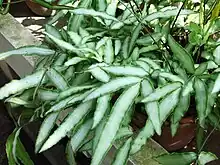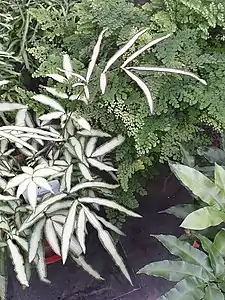Pteris cretica
Pteris cretica, the Cretan brake,[1] ribbon fern,[2] or Cretan brake fern, is a species of evergreen fern in the family Pteridaceae, native to Europe, Asia and Africa.
| Pteris cretica | |
|---|---|
 | |
| P. cretica var. albolineata | |
| Scientific classification | |
| Kingdom: | Plantae |
| Clade: | Tracheophytes |
| Division: | Polypodiophyta |
| Class: | Polypodiopsida |
| Order: | Polypodiales |
| Family: | Pteridaceae |
| Genus: | Pteris |
| Species: | P. cretica |
| Binomial name | |
| Pteris cretica | |

Description
The fern grows to 75 cm (30 in) tall by 60 cm (24 in) broad. It has arching pinnate fronds each bearing up to five pinnae.[3][4]
Cultivation
Pteris cretica is cultivated widely by plant nurseries. It is used in gardens in the ground and as a potted plant, and as a houseplant. The variety with variegated foliage, Pteris cretica var. albolineata, is also widely used, brightening shade gardens.
Both types thrive year round outdoors in subtropical climates, such as California. With a minimum temperature of 2 °C (36 °F), both require protection from frost, though the species is hardier and can be grown outdoors during the summer months in cold climates.[3]
The species,[5] and the variety P. cretica var. albolineata (syn. P. nipponica),[6] have both gained the Royal Horticultural Society's Award of Garden Merit.[7]
A relictual presence is certificated in the Italian peninsula Lazio (Ponte Terra gorge, San Vittorino, Rome).
References
- USDA, NRCS (n.d.). "Pteris cretica". The PLANTS Database (plants.usda.gov). Greensboro, North Carolina: National Plant Data Team. Retrieved 31 January 2016.
- BSBI List 2007 (xls). Botanical Society of Britain and Ireland. Archived from the original (xls) on 2015-06-26. Retrieved 2014-10-17.
- RHS A-Z encyclopedia of garden plants. United Kingdom: Dorling Kindersley. 2008. p. 1136. ISBN 978-1405332965.
- "Missouri Botanical Garden - Pteris cretica". Retrieved 27 June 2013.
- "RHS Plant Selector - Pteris cretica". Retrieved 17 February 2021.
- "RHS Plant Selector - Pteris nipponica". Retrieved 22 February 2021.
- "AGM Plants - Ornamental" (PDF). Royal Horticultural Society. July 2017. p. 82. Retrieved 23 September 2018.